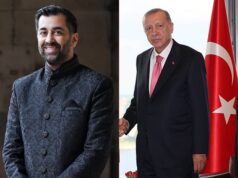The suspect, who shouted “Allahu Akbar” during his ‘stabbing spree’, was previously imprisoned for terror-related offences in France in 2016 and has ties to several Islamic terrorists, reports state.
A knife and hammer attack on a street in central Paris by a suspected ISIS terrorist has left one dead and at least two others injured. The incident occurred close to the Eiffel Tower around 21:00 local time on Saturday, December 2nd.
A report by the BBC explains that the man killed was a German tourist who was serving as a nurse. France’s Minister for the Interior, Gérald Darmanin, confirmed that he was with his wife when being fatally stabbed on Quai de Grenelle.
The report explains that the assailant, a 26-year-old French national of Iranian descent – after stabbing the nurse – went on to attack two more people, including a “66-year-old British victim in the eye with a hammer”.
Reportedly, the suspect released a video moments before the savage attack where he declared himself to be affiliated to the Islamic State (ISIS).
The attack is the latest in a spate of violent incidents, both within France and Europe in general.
As reported by the Financial Times, France is on high alert, especially after raising its security threshold in October following a knifeman – from Chechnya – murdering a teacher in a school in Northern France. The attack was condemned by French President Emmanuel Macron as “barbaric Islamist terrorism”.
Chechnya is a predominantly Islamic republic of Russia situated near the Caspian Sea.
This November, in the rural French village of Crépol, another ‘stabbing spree’, occurred which resulted in the murder of a 16-year-old identified only as Thomas, who was knifed in the chest and neck.
According to Remix News, footage of the incident circulated on social media which showed victims being stabbed by a group of young men shouting “f**king gwer” – a slur against white people in Arabic.
Much like how the Irish government focussed on the ‘far-right’ in response to the stabbing of a 5-year-old girl by a man of Algerian origin in Dublin, Mr Darmanin said he was “going to propose a ban on small ultra-right groups”, according to the BBC.
Regarding this most recent attack, of which the assailant was identified as Arman Rajabpour-Miyandoab, Mr Darmanin told police that the man was “upset” because “so many Muslims are dying in Afghanistan and in Palestine”.
It is understood that he suggested that France was ‘complicit’ in the deaths of Palestinians from the ongoing conflict with Israel and his brutality was intended to “avenge Muslims”.
In response, Macron wrote on X (formerly Twitter): “I’m addressing all my condolences to the family and loved one of the German national who died … in the terror attack in Paris.”
Macron has quickly drawn criticism from other French politicians, however. Speaking to reporters on Sunday, the president of the National Rally, Jordan Bardella, said: “The suspect … was not only on a radicalisation watchlist, but had also been in prison”.
“We need more than just words,” Bardella continued.
Of great concern to many is that Rajabpour-Miyandoab’s background as an extremist was well-known, yet no measures were successfully taken to prevent the tragedy that unfolded in Paris.
He was known to French counter-terrorism forces as he was previously jailed in 2016 after planning a separate terror attack in Paris.
The suspect had received a four-year sentence in 2016 before being released to stay with his parents.
Furthermore, before Rajabpour-Miyandoab’s imprisonment, he was in contact with jihadist fighters who travelled to Syria to fight on behalf of ISIS, according to reports.
Allegedly, he also communicated with Abdoullakh Anzorov, who beheaded French secondary school teacher Samuel Paty in 2020 after he shared cartoons of Prophet Muhammad in class.




